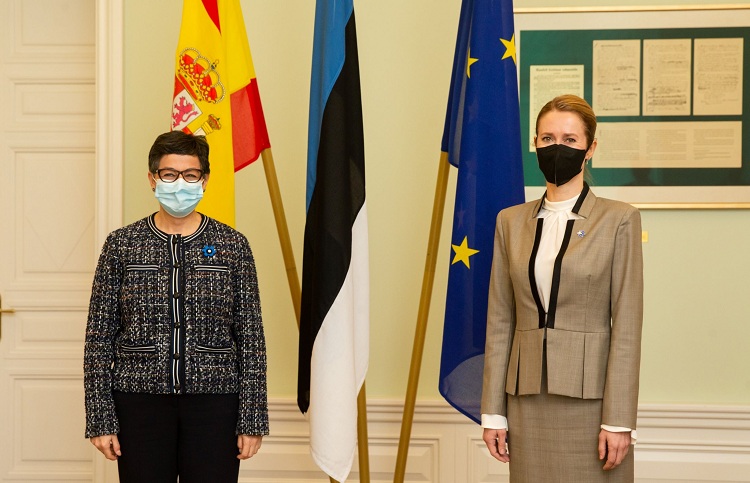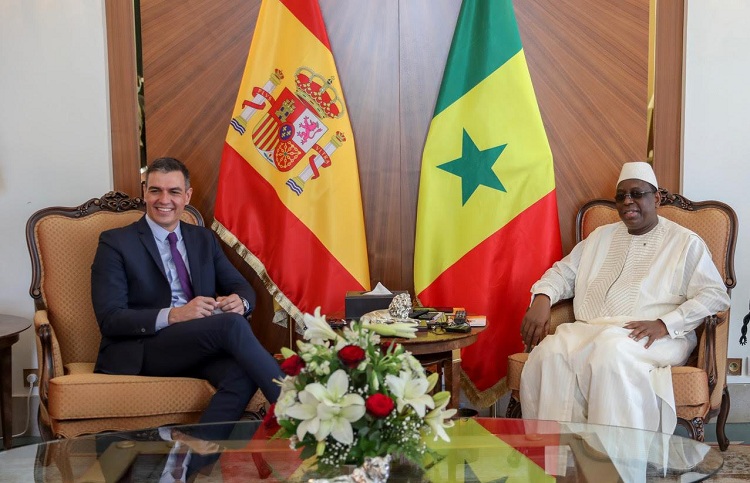Eduardo González
The Government of Estonia, one of the countries in Europe with the highest incidence of COVID-19 infections, agreed yesterday with the Minister of Foreign Affairs, Arancha González Laya, on the need to deploy the European health certificate as soon as possible and to adopt “common principles” among EU states regarding the safety of vaccines.
González Laya completed yesterday the third and last stage of the tour of the three Baltic countries in Tallinn, where she was received by her counterpart, Eva Maria Liimets, by the Prime Minister, Kaja Kallas, and by the President of the country, Kersti Kaljulaid. The day concluded with the opening of the exhibition Zuloaga, soul of Spain, at the Mikkeli Museum in Tallinn, organized by the Spanish Embassy to commemorate the centenary of bilateral diplomatic relations.
During the first meeting, the two foreign ministers addressed various bilateral and European issues, the centenary of relations, coordination in the response to COVID-19, ecological transition and digitalization, González Laya reported on her Twitter account. On the pandemic, according to the Estonian Ministry of Foreign Affairs, Gonzalez Laya and Limets discussed “in more detail the coordination of the COVID-19 crisis, the need to accelerate the supply of vaccines and the prospects for restoring travel mobility”. Estonia is among the EU states hardest hit by the coronavirus, with an incidence of more than 1,000 infections per 100,000 inhabitants in the last 14 days, according to the European Centre for Disease Prevention and Control (ECDC).
At the same meeting, Limets declared that “Spain is a good cooperation partner for Estonia in the European Union and an important ally in NATO” and expressed her gratitude for “Spain’s significant contribution to the security of the region with its participation in NATO’s air security mission in the Baltic”. The Spanish troops in Estonia are integrated in NATO’s Center of Excellence in Cyber Defense, of which Spain is not only a founding member, but is also at the head of the Operations Command.
Later, González Laya was received by Prime Minister Kaja Kallas, with whom she discussed issues such as vaccination against COVID-19, the NATO summit, the Southern Neighborhood, digitalization and Latin America, according to the head of Spanish diplomacy. During this meeting, Kallas and González Laya agreed on the importance of “a coherent EU approach to both vaccine safety and vaccination certificates”, local media reported. “Vaccination is our priority in the fight against the COVID-19 pandemic”, the prime minister said. “It is important that EU member states have common principles with regard to vaccine safety”, Kallas added. “We both support the rapid roll-out of digital vaccination certificates in the EU and around the world to restore travel safety”, the prime minister said via Twitter.
“We also had a fruitful discussion on stability and growth in our eastern and southern neighborhood”, continued Kallas, who thanked Spain’s “solidarity” on security in the Baltic region and announced that an Estonian surveillance aircraft will participate, starting this spring, in the joint operation of the FRONTEX mission in the Canary Islands.
González Laya concluded his institutional program with President Kersti Kaljulaid, who paid an official visit to Spain on March 8, coinciding with the centenary of the establishment of diplomatic relations between Spain and Estonia. During their meeting, González Laya and Kaljulaid discussed several issues on the agenda of the UN Security Council, to which Estonia currently belongs as a non-permanent member, according to the Spanish minister.







